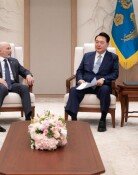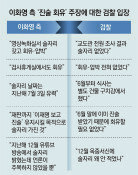How many refugees can aboard 'Boat Korea'?
How many refugees can aboard 'Boat Korea'?
Posted July. 27, 2018 07:32,
Updated July. 27, 2018 07:32
Imagine we are drifting in the ocean on a lifeboat. There are 50 people aboard and there is room for 10 more. Outside the boat, one hundred people are thrashing around in the water, begging for help. What should we do?
There are three options. First, try to save everyone. Second, save only 10. Third, turn away. Most people would choose the first or second. But according to U.S. ecologist Garrett Hardin, who came up with the “lifeboat theory,” said number three was the right answer. When you try to fill a boat with 150 people when the limit is 60, everyone drowns. But it makes no sense to pick just 10. You would need to pick a few extra just in case and how would you pick 10 out of 100? People who are noble? Desperate? Or first come, first served? Hardin used his theory to insist that “Perfect justice creates perfect dissolution” and was met with criticism when he asserted that advanced countries should not help developing nations to prevent environmental destruction caused by overpopulation.
Let’s look at the Korean refugee issue, sparked by the Yemenis refugee crisis in Jeju Island. First, some people say that it is humane duty to accommodate as many refugees in critical situations as possible. Korea signed the Refugee Convention in 1992 and became the first Asian country to enact the Refugee Act in 2012. However, only 849 foreigners have been granted refugee status as of June this year and the refugee approval rate stands at only 4 percent, whereas the figure in the United States, Germany, the United Kingdom and Canada is 25-45 percent. Could it be that “fake” refugees come to Korea? If not, the approval rate should be at least a double-digit figure.
On the contrary, others believe that the refugee evaluation process should be strengthened or call for the scrapping of the Refugee Act. They say that we have enough people in need on our own hands, dealing with social issues such as unemployment and inequality, and cannot afford to have our jobs and welfare stolen by refugees, in addition to crimes and terrorist threats. In particular, the opposition is particularly strong among those in their 20s and women, with high concerns for jobs and safety.
What comes first: human or nationality? As with most dilemmas, the solution to the refugee issue lies between both extremes. In other words, the golden mean, as Aristotle said. For example, bravery sits between temerity and cowardice. On the other hand, the golden mean can be understood differently by different people. For a good swimmer, it is courageous to save a drowning person but cowardly if the situation is ignored. But it is temerity if a person who is a good runner but unable to swim dives in to save the drowning person. It would be cowardly to ignore the drowning person and brave to run find someone for help.
There are foreigners who wave at us in "Boat Korea," fleeing from poverty, war and political oppression. It is cowardly to turn a blind eye as the 10th largest economy in the world. We cannot afford to scrap the Refugee Act, withdraw from the convention and back off. Among the 140 signatories to the Refugee Convention, no country has ever withdrawn from the pact. However, it would be temerity to accept more than we can afford. Japan, who opens its borders to foreign workers to address labor shortage issues, only approves 0.2 percent of refugee applications. Instead, the neighboring country is generous to extend financial support, becoming the fourth largest donator to the UN refugee agency in 2017).
A recent poll conducted by Gallup Korea asked 1,002 adults in Korea of what they thought of the Yemeni refugee issue in Jeju. The majority replied in favor of accepting the refugees: 11 percent said they should be accepted, if possible and 62 percent favored acceptance to the minimum extent. The government is obliged to come up with an answer to the refugee issue posted on the presidential office's national petition website by August 13. We hope that the answer is not coward, reckless but courageous.
Jin-Yeong Lee ecolee@donga.com







